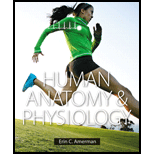
Human Anatomy & Physiology
1st Edition
ISBN: 9780805382952
Author: Erin C. Amerman
Publisher: PEARSON
expand_more
expand_more
format_list_bulleted
Concept explainers
Question
Chapter 19.5, Problem 13QC
Summary Introduction
To review:
The common causes of bleeding disorders.
Introduction:
A bleeding disorder can be defined as a condition that affects a person’s body, when normally blood coagulation occurs that can be referred as the change in the form of blood from a liquid state to gelatin state. When a person is injured, the blood begins to clot to prevent massive blood loss. Sometimes clotting of blood fails to take place and causes severe bleeding which may result in death.
Expert Solution & Answer
Want to see the full answer?
Check out a sample textbook solution
Students have asked these similar questions
its an open book assignemnt
Describe two different gene regulation mechanisms involving methylation
What is behavioral adapt
Chapter 19 Solutions
Human Anatomy & Physiology
Ch. 19.1 - Prob. 1QCCh. 19.1 - Prob. 2QCCh. 19.1 - 3. How does blood regulate temperature and...Ch. 19.1 - 4. What are the four main categories of plasma...Ch. 19.1 - Prob. 5QCCh. 19.2 - Describe the structure of a typical erythrocyte.Ch. 19.2 - Prob. 2QCCh. 19.2 - 3. Walk through the basic steps of...Ch. 19.2 - 4. What is the lifespan of an erythrocyte?
Ch. 19.2 - Prob. 5QC
Ch. 19.2 - Prob. 6QCCh. 19.2 - Prob. 7QCCh. 19.3 - How do granulocytes and agranulocytes differ?Ch. 19.3 - Prob. 2QCCh. 19.3 - Compare the two types of agranulocytes.Ch. 19.3 - 4. How do B and T lymphocytes differ?
Ch. 19.3 - 5. What does a monocyte become in the tissues?...Ch. 19.3 - Prob. 6QCCh. 19.3 - 7. How do the lymphoid and myeloid cell lines...Ch. 19.3 - 8. Where do T and B lymphocytes mature?
Ch. 19.4 - Prob. 1QCCh. 19.4 - Prob. 2QCCh. 19.5 - Prob. 1QCCh. 19.5 - Prob. 2QCCh. 19.5 - 3. How are platelets triggered to aggregate?
Ch. 19.5 - Prob. 4QCCh. 19.5 - How do the intrinsic/contact activation and...Ch. 19.5 - Prob. 6QCCh. 19.5 - Prob. 7QCCh. 19.5 - What is thrombolysis?Ch. 19.5 - Prob. 9QCCh. 19.5 - Prob. 10QCCh. 19.5 - Prob. 11QCCh. 19.5 - Prob. 12QCCh. 19.5 - Prob. 13QCCh. 19.5 - Prob. 14QCCh. 19.6 - Prob. 1QCCh. 19.6 - Prob. 2QCCh. 19.6 - Prob. 3QCCh. 19.6 - Prob. 4QCCh. 19.6 - Prob. 5QCCh. 19 - Prob. 1CYRCh. 19 - Prob. 2CYRCh. 19 - List the seven major functions of blood.Ch. 19 - Prob. 4CYRCh. 19 - Prob. 5CYRCh. 19 - Prob. 6CYRCh. 19 - Prob. 7CYRCh. 19 - Leukocytes are: a. nucleated cells that function...Ch. 19 - Prob. 9CYRCh. 19 - Fill in the blanks: Lymphocytes are derived from...Ch. 19 - Prob. 11CYRCh. 19 - Number the steps of hemostasis in order, putting 1...Ch. 19 - Prob. 13CYRCh. 19 - Prob. 14CYRCh. 19 - Prob. 15CYRCh. 19 - Prob. 16CYRCh. 19 - Prob. 17CYRCh. 19 - 18. Which antigens does a person with blood type...Ch. 19 - Prob. 19CYRCh. 19 - Prob. 20CYRCh. 19 - 1. Explain how blood, being a liquid, enables all...Ch. 19 - Prob. 2CYUCh. 19 - 3. The anticoagulant drug warfarin primarily...Ch. 19 - 4. Cirrhosis of the liver often reduces production...Ch. 19 - 1. A blood sample from your patient shows that she...Ch. 19 - Prob. 2AYKACh. 19 - Prob. 3AYKACh. 19 - Prob. 4AYKB
Knowledge Booster
Learn more about
Need a deep-dive on the concept behind this application? Look no further. Learn more about this topic, biology and related others by exploring similar questions and additional content below.Similar questions
- 22. Which of the following mutant proteins is expected to have a dominant negative effect when over- expressed in normal cells? a. mutant PI3-kinase that lacks the SH2 domain but retains the kinase function b. mutant Grb2 protein that cannot bind to RTK c. mutant RTK that lacks the extracellular domain d. mutant PDK that has the PH domain but lost the kinase function e. all of the abovearrow_forwardWhat is the label ?arrow_forwardCan you described the image? Can you explain the question as well their answer and how to get to an answer to an problem like this?arrow_forward
- Describe the principle of homeostasis.arrow_forwardExplain how the hormones of the glands listed below travel around the body to target organs and tissues : Pituitary gland Hypothalamus Thyroid Parathyroid Adrenal Pineal Pancreas(islets of langerhans) Gonads (testes and ovaries) Placentaarrow_forwardWhat are the functions of the hormones produced in the glands listed below: Pituitary gland Hypothalamus Thyroid Parathyroid Adrenal Pineal Pancreas(islets of langerhans) Gonads (testes and ovaries) Placentaarrow_forward
- Describe the hormones produced in the glands listed below: Pituitary gland Hypothalamus Thyroid Parathyroid Adrenal Pineal Pancreas(islets of langerhans) Gonads (testes and ovaries) Placentaarrow_forwardPlease help me calculate drug dosage from the following information: Patient weight: 35 pounds, so 15.9 kilograms (got this by dividing 35 pounds by 2.2 kilograms) Drug dose: 0.05mg/kg Drug concentration: 2mg/mLarrow_forwardA 25-year-old woman presents to the emergency department with a 2-day history of fever, chills, severe headache, and confusion. She recently returned from a trip to sub-Saharan Africa, where she did not take malaria prophylaxis. On examination, she is febrile (39.8°C/103.6°F) and hypotensive. Laboratory studies reveal hemoglobin of 8.0 g/dL, platelet count of 50,000/μL, and evidence of hemoglobinuria. A peripheral blood smear shows ring forms and banana-shaped gametocytes. Which of the following Plasmodium species is most likely responsible for her severe symptoms? A. Plasmodium vivax B. Plasmodium ovale C. Plasmodium malariae D. Plasmodium falciparumarrow_forward
arrow_back_ios
SEE MORE QUESTIONS
arrow_forward_ios
Recommended textbooks for you
 Human Physiology: From Cells to Systems (MindTap ...BiologyISBN:9781285866932Author:Lauralee SherwoodPublisher:Cengage Learning
Human Physiology: From Cells to Systems (MindTap ...BiologyISBN:9781285866932Author:Lauralee SherwoodPublisher:Cengage Learning






Human Physiology: From Cells to Systems (MindTap ...
Biology
ISBN:9781285866932
Author:Lauralee Sherwood
Publisher:Cengage Learning